- Home
- Elif Shafak
The Happiness of Blond People (Penguin Specials)
The Happiness of Blond People (Penguin Specials) Read online
Penguin Shorts
‘We believed in the existence in this country of a vast reading public for intelligent books at a low price, and staked everything on it’
Sir Allen Lane, founder of Penguin Books.
The first affordable quality books for a mass audience were brought out by Penguin nearly eighty years ago. And while much has changed since then, the way we read books is only now becoming different. Sometimes it is still only a hardback or paperback book that will do. But at other times we prefer to read on something either more portable – a dedicated reading device or our smart mobile phone – or more connected, such as a tablet or a computer.
Where we are or how much time we have often decides what it is we will read next.
Penguin Shorts and Penguin Specials are designed to fill a gap. They are short, they are original and affordable, and they are written by some of today’s best and most exciting writers. And they are available only in digital form.
Written to be read over a long commute or a short journey, in your lunch hour or between dinner and bedtime, these brief books provide a short escape into a fictional world or act as a primer in a particular field or provide a new angle on an old subject.
Always informative and entertaining, Penguin Shorts and Penguin Specials offer excellent writing that you can read on the move or in a spare moment for less than the price of a cup of coffee.
Contents
About the Author
The Happiness of Blond People
ABOUT THE AUTHOR
Elif Shafak is the acclaimed author of the award-winning The Gaze and The Bastard of Istanbul and is the foremost female author in Turkey. She is a contributor to the Telegraph, the Guardian and The New York Times and her TED talk on the politics of fiction has received over 300,000 views since July 2010. She is married with two children and divides her time between the Istanbul and the UK.
The Happiness of Blond People
Three years ago, at The Hague Airport in Rotterdam, feeling slightly withdrawn and weary after giving the opening speech of an international literary festival whose main theme was ‘fear’ – fear of globalization, terrorism, refugees, climate change and so forth – I was in a queue waiting to check in my luggage with Turkish Airlines. In front of me was a family with three children: two girls with identical haircuts and dresses, and a boy wearing a brown suit and bow tie, looking like a miniature version of the famous fictional detective Hercule Poirot. The mother was feeding the little ones home-made börek, filled pastries, while the father, middle-aged and Turkish, was engaged in a lengthy conversation with another passenger. At some point, the second man raised his hands in exasperation and exclaimed, ‘Oh, it’s absolutely insane what she is doing to you!’ I don’t remember what piqued my curiosity, the word ‘insane’ or the dramatic gesture itself, but I began to eavesdrop on their exchange. The father was explaining how every time his children ran around the flat or made the slightest noise, the elderly Dutch lady downstairs instantly called the police. And, to his surprise, the police did indeed arrive each time, with their emergency lights on, their sirens blaring, as if there had been a threat to national security.
‘We would have moved out long ago, but it’s not easy,’ he continued. ‘Imagine, I come home dog-tired every evening and get so stressed out that I tense at every little sound. No peace of mind. In our own house we are whispering and tiptoeing like petty criminals!’
‘What is wrong with your neighbour?’ said the other passenger – a man with kind hazel eyes and a drooping moustache. ‘Does she expect you to raise your kids in an aquarium, or what?’
There was a pause, a mutual understanding, an unspoken camaraderie. Into that fleeting silence the second man murmured as though to himself: ‘You know, I never understand. How is it that their children are so quiet and well disciplined?’
‘Yeah,’ said the distressed father, his voice suddenly softer. ‘Blond children never cry, do they?’
The queue proceeded, I checked in my bags, and during the hustle and bustle of the day, and the ordinary chaos I encountered in Istanbul upon my arrival, the two immigrant men were pushed to the margins of my memory. That sentence, however, stuck with me. I started mulling over what they had meant. I started contemplating the happiness of blond people.
Heidegger believed that Angst was an integral part of our lives, intrinsic to the very nature of the human condition. Across the wide spectrum of feelings and emotions, it was anxiety that most reflected the essence of our existence, our fragility, our mortality. By Angst Heidegger meant something quite different from fear. The latter is almost always fear of someone or something – be it concrete or abstract, rational or irrational, plausible or preposterous. Yet the person suffering from anxiety, unlike the person in the grip of fear, cannot easily pinpoint a reason for his or her state of mind. As such, anxiety is at best elusive, at worst a sheer mystery. ‘The clear courage for genuine anxiety guarantees the mysterious possibility of the experience of Being,’ Heidegger said. ‘For close by genuine anxiety [from] the terror of the abyss dwells awe. This clears and protects that realm of human being within which man dwells at home in the enduring.’1 Angst transcends classes and cultures, and its vagueness lies at the core of Dasein, or being in this world.
Nonetheless, as fundamental and universal as anxiety tends to be, we may rightly assume that there are stages in one’s life when the feeling is augmented, in other words, when the terror of the abyss is heightened. If such is the case, emigrating – abandoning one’s hometown and loved ones, moving into a new place, being exposed to an alien culture where everything is, or seems, unfamiliar and starting life again from scratch – is likely to be one of those tempestuous stages. ‘We have always emigrated from our land for the same reasons and with the same feelings of remorse,’ says the Lebanese intellectual and author Amin Maalouf in his memoir, Origins. The one who leaves his or her homeland for good is often stalked by mixed emotions of guilt, longing, confusion, anticipation and insecurity, some or all of which can spring up from out of nowhere, for no reason at all.
It has always amazed me to find first-generation immigrants – now old and frail but otherwise well off and successful, who have fully adapted to their new countries – still being stalked, even after thirty or forty years, by this odd disquietude. It is a condition that their children and grandchildren may not share and find rather hard to understand.
I remember vividly an elderly Armenian shopkeeper whom I had met by chance in San Francisco while writing my novel The Bastard of Istanbul. We had a long, genial chat about our common cuisine, proverbs, painful history and folk songs that had the same melody but slightly different lyrics in various tones of sadness – and about how both Armenian and Turkish stories tended to start with the same preamble: Once there was, once there wasn’t … He had been born in Istanbul, moved to the States as a boy in the mid 1930s, got married there and in general led a prosperous life. Yet when he told me about his home in Istanbul there were tears in his eyes. ‘You know why I have never gone back to visit the old city?’ he said. ‘Because if I go I won’t come back to America. Ever! I’ll stay there, die there and be buried there. I love it so much. My kids don’t get it, they are too American, what do they know about unrequited love?’
Both daring and timid, both actor and audience in a theatre of dizzying change, the immigrant is a fragmented being who carries the ghosts of his past wherever he goes. The sharper the conflicts at work in the host society and the more negative the reception of outsiders, the greater the newcomer’s inner divisions. ‘The immigrant must be prepared to swallow his share of humiliations every day. He has
to accept that life will treat him with disrespect and that he’ll be smacked and jostled with undue familiarity.’2 Displacement and expatriation are conducive to a more intense Angst.
One writer who was fascinated with Angst all throughout his life was Kafka. Born to German-speaking Jewish parents in Prague, a lone member of an exiled community, fluent in two languages yet never fully at home anywhere, he was afflicted with melancholy and malaise from early on. As a child he witnessed the destruction of the Jewish quarter in the city, and probably never felt sure of the ground beneath his feet. In a letter written years later to Milena Jesenská, he says, ‘It follows perhaps that we are both married, you in Vienna, I to my fear in Prague, and that not only you, but I, too, tug in vain at our marriage.’3 Although Kafka’s trajectory needs to be viewed within a particular historical context, a lack of continuity, stability and security, all three of which are germane to the immigrant experience everywhere around the world, must each have played its part in heightening his Angst.
Yet, paradoxically, a reduction of anxiety is surely one of the reasons why people relocate. They move to other lands not simply for the sake of money, jobs, education or freedom. Behind their willingness to pull up stakes may simply be the wish to be happy.
But what exactly is happiness? The concept is not easy to define, and almost impossible to measure objectively. In Civilization and Its Discontents, Freud interprets happiness as a common goal for all human beings. ‘What do they demand of life and wish to achieve in it? The answer to this can hardly be in doubt. They strive after happiness; they want to become happy and remain so.’ Though the desire to be happy, and for our children to be happy, is a common characteristic of human beings, we do not all succeed in actually feeling happy, even under the same circumstances. Everyone’s threshold for happiness is different. As Simone de Beauvoir eloquently stated in The Second Sex, ‘It is not too clear just what the word happy means and still less what true values it may mask. There is no possibility of measuring the happiness of others, and it is always easy to describe as happy the situation in which one wishes to place them.’4 What concerns me in this essay is not the criteria for happiness, but rather the perception of happiness, particularly cultural perceptions. More precisely, I am intrigued by the assumption that Westerners are overall happier than non-Westerners.
To this day, much has been said and written about the economic reasons behind the flurry of emigration in the twentieth and twenty-first centuries. The religious, social and political aspects, too, have been analysed in depth. Minorities running away from discrimination, individuals seeking political asylum, workers in need of jobs and housing … In addition to these factors, could the happiness of blond people be a basis for ongoing emigration and brain drain? Could the perceived difference in levels of happiness in different places be contributing to worldwide dislocations and relocations?
Throughout my travels East and West, I have often come across a widespread belief that the inhabitants of the Western world are, in general, if not happier and luckier, at least beset with fewer problems than those in the East. A common state of well-being, real or imaginary, is attributed to people in Europe, Canada and the USA. At first glance, they do not need to deal with civil wars, warlords or tribal quarrels, poverty, corruption, human-rights violations, despotism, droughts or massive earthquakes. If life – or fate – has a weight of its own, then it is not the same everywhere, so goes the assumption. In the West, life is thought to be simpler, and fate, lighter.
There is an equally deeply ingrained counter-assumption: that life in the East is more real and less degenerate than in the West; and that Western societies are so individualistic, so atomized, that they lack sufficient communal ties and family networks to support a person in his or her hour of need. This, too, happens to be an argument one finds widely today both in social media and daily parlance. A half-Circassian, half-Turkish housewife I met in Jordan in the mid 1990s told me how she pitied the women in the West for being reduced to nothing but sexual objects. ‘That’s why they are so afraid of getting old,’ she said. ‘When they lose their looks, they lose everything.’ When I asked what she thought of families in the West, she replied: ‘They kick their offspring out of the house as early as age fourteen; no wonder those kids then become drug addicts and whatnot. We are not like that. Family is everything to us. We die for our families. That’s why, unlike them, we do not end up being depressed.’
A secondary-school student I met in Ankara during a literary event put this to me in a slightly different way. ‘If you are young, it is better to live in the West than in the East,’ he said. ‘But if you are old, then it is better to be in the East than in the West, because we respect our elders, whereas they don’t. In Europe I have seen old ladies in supermarkets buying one courgette, one carrot, one tomato, one bunch of parsley. Have you ever seen a Muslim woman doing that? No! We always buy at least a kilo, if not more, because we cook for the entire family.’
While writing my recent novel Honour, I have had the good fortune to meet immigrant families, both Turkish and Kurdish, in various European cities. I have spoken with members of first, second and third generations, digesting their stories, respecting that there were some tales they chose not to mention while being equally amazed by how much they shared. Their family structures varied greatly, but they all had one thing in common: a desire to communicate, a need to explain and a general sense of being misunderstood, if not misplaced. While the future of immigrants in the West remains a highly politicized issue and the enthusiasm for multiculturalism is on the wane, it is striking to see how many immigrants believe their stories are yet to be told, yet to be heard.
It is estimated that Arabs, Turks, Kurds, Iranians, Pakistanis, Bangladeshis, Malaysians – Muslims, including newcomers and native born – constitute 5 per cent of Europe’s population. In France, where there is the largest Muslim minority, they number more than 4.5 million. In the UK the figure is around 1.6 million. The relatively higher birth rate in Muslim communities, taken together with the ongoing influx of immigration, indicates that in forthcoming decades the number of European Muslims will significantly rise. In the not so distant future Muslim children may be in the majority at numerous schools throughout Europe. Of their parents and grandparents today, a considerable number identify themselves by religion before anything else – such as being British, or Norwegian, or, for that matter, European. There are also many non-practising individuals who are only nominally Muslim but who nonetheless feel a sense of solidarity with their community – especially when they see that it is being distanced or disparaged by the majority. Strikingly, even the word ‘immigrant’ carries religious, rather than cultural and economic, connotations more and more frequently on a daily basis. When politicians, scholars or journalists talk about ‘immigrants in Europe’, for the most part they are referring to ‘Muslims in Europe’; and when they discuss Muslim diasporas in Europe, it is almost always in relation to heated topics. As Tariq Ramadan writes in the Christian Science Monitor, ‘Over the last two decades Islam has become connected to so many controversial debates – violence, extremism, freedom of speech, gender discrimination, and forced marriage, to name a few – it is difficult for ordinary citizens to embrace this new Muslim presence as a positive factor.’
The 9/11 attacks, the 2004 Madrid train bombings, the 2005 London bombings, the 2006 Danish cartoons incident, the assassination of Theo van Gogh, the anti-Islamic campaign of the Dutch MP Geert Wilders, the debates on banning the veil in France and minarets in Switzerland, the wars in Afghanistan and Iraq, and, most recently, the killing of eighty-five people by a far-right extremist in Norway who was openly against multiculturalism and saw Muslims as a threat to Europe’s foundation … In the past few years only, one tragedy after another, one tension after another, one war after another, deepened the fault lines within the European public space, creating an atmosphere of perpetual Angst. On each side of these fault lines invisible ghettos were erected, social cocoons
of the like-minded. They are powerful psychological barriers, these ghettos. Ostensibly to raise children in safer environments, or to avoid the chaos of the metropoles, or for purely ideological reasons, more and more people are shunning big cities, and, even when they can’t, they simply choose to socialize with their own.
So the question is, how can Muslims and non-Muslims exist side by side in a well-functioning, well-balanced democracy? Can the symbols and rituals of Islam, as well as other religions, be given free rein, and, if so, to what extent? In the name of freedom of expression can everyone, including Islamic radicals, be allowed to organize marches and protests? How would Islamic principles and practices – the slaughtering of animals for halal meat, religious festivals, burial traditions, hijab and so on – be incorporated into liberal, pluralistic societies?
Inward-looking, all-of-a-piece ghettos may be offering a sense of security and stability to their members, but they are not necessarily contributing to the growth of a healthy political–public space. The latter will flourish where there is inclusivity, hybridity and diversity, in other words, where people of dissimilar upbringings can interact on multiple levels, generating common ideals, common interests – and a common future. If larger numbers of people with opposing views and conflicting priorities can be encouraged to participate in the formation of public discourse, if the overlapping areas between separate subcultures can be expanded, beneficial effects will result not only for those involved but also for society at large. Democracy, a true, robust democracy worthy of the name, does not depend solely on political parties, politicians and parliaments. Nor does it draw only upon institutional checks and balances. More fundamentally, it needs people who have faith in democracy, citizens who trust that their opinions matter and who, together with others, are willing to contribute to a better future. A harmonious political public space is a prerequisite to the survival of democracy, given the challenges of our times.

 Black Milk: On Writing, Motherhood, and the Harem Within
Black Milk: On Writing, Motherhood, and the Harem Within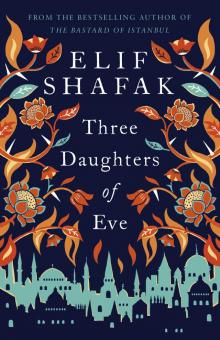 Three Daughters of Eve
Three Daughters of Eve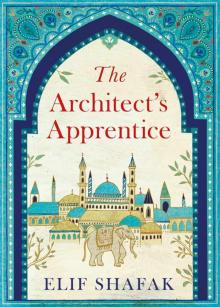 The Architect's Apprentice
The Architect's Apprentice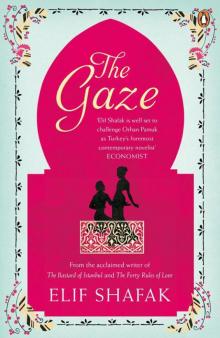 The Gaze
The Gaze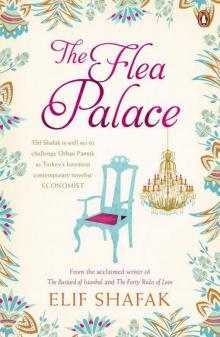 The Flea Palace
The Flea Palace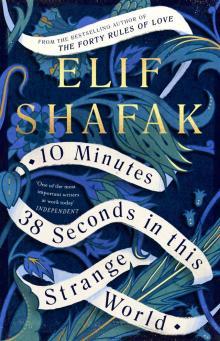 10 Minutes 38 Seconds in this Strange World
10 Minutes 38 Seconds in this Strange World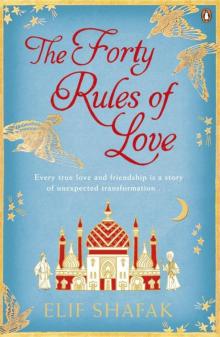 The Forty Rules of Love
The Forty Rules of Love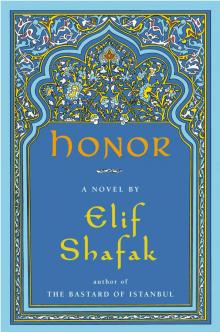 Honor
Honor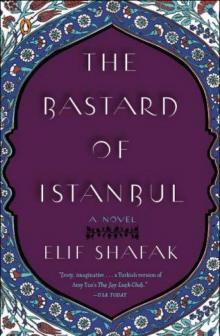 The Bastard of Istanbul
The Bastard of Istanbul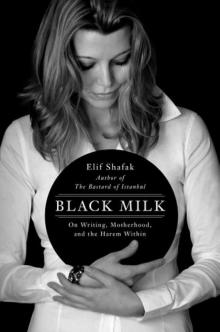 Black Milk
Black Milk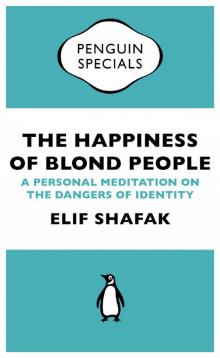 The Happiness of Blond People (Penguin Specials)
The Happiness of Blond People (Penguin Specials)